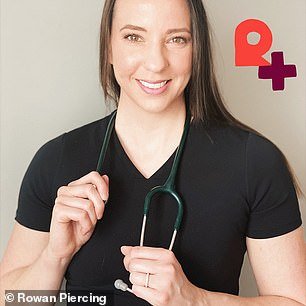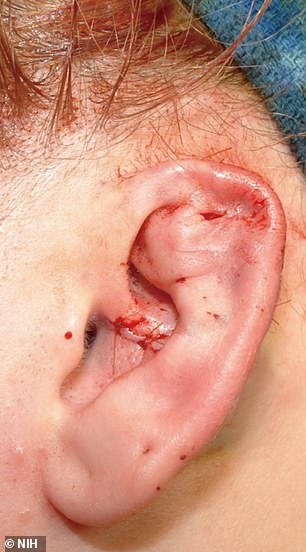Nurse warns against getting piercings at the mall- after teen’s ear is EATEN by gruesome bacterial infection
Nurses are sounding the alarm about the dangerous risks of dirty piercings after a healthy teenager had to undergo reconstructive surgery due to a serious complication in her ear piercing.
Surgeons in New Jersey were forced to cut out and drain a pus-filled wound that had developed on a 17-year-old’s ear cartilage after she became resistant to the antibiotics doctors initially gave her to fight the infection.
The complication occurred about three weeks after she got her piercing, which was performed by a mall employee with a piercing gun.
When she finally went to the hospital, the infection had already eaten away some of the cartilage in her upper ear.
Sarah Lacy, a registered nurse and Associate Director of Piercing Research and Innovation at cosmetics company Rowan, told DailyMail.com that she sees these types of complications often – and it’s usually due to mistakes made by the piercer.
She said: ‘There’s a lot of things that can go wrong, you know, without proper care… You can get anything from a minor infection to something as intense as a huge, huge, huge cartilaginous infection.’
And in severe cases, this can lead to the operating table.
Complications are more common when someone is pierced with an earring gun than when someone is pierced with a hollow needle
Ms. Lacy says these problems can be easily avoided with precautions that too few piercers take — and that poorly trained assistants at jewelry stores are often to blame.
But some of the bad results are user errors.
Common mistakes people make with earrings include not cleaning them often enough, wearing one that is too short, and pressing the back of it too close to the ear, which can cause irritation and embedding.
Embedding occurs when an infection causes the tissue around the earring to swell and ‘swallow’ it into the ear.
TikTok user hannahbanana81374 shared a video of the disturbing event and wrote, “POV: You woke up to find your ear had swallowed your earring.”

Sara Lacy, a registered nurse, now works at Rowan, a piercing company that employs nurses to make new earrings
In the video, Hannah shows her visit to the emergency room, where doctors numbed her tissue to remove the earring from her ear.
This is the usual course of action for embedded earrings, Ms. Lacy said.
Doctors usually use tweezers to pull out the earring or make a small incision to remove it.
Another culprit for earring accidents is using the wrong piercing technique: More earrings placed with piercing guns become infected than earrings placed with a hollow piercing needle, Ms. Lacy said.
The Rutgers doctors who operated on the 17-year-old with the cartilage infection, noted that “cartilage, if punctured at all, must be penetrated with sharp, hollow needles, which will drill out the cartilage,” and not with a gun.
Using a gun can cause the cartilage to “crack” and cause bleeding that can lead to later complications, they wrote.
Some guns are also reusable, meaning the same needle can be used several times a day on many people.
This is according to the Association of Professional Piercers‘put down[s] clients coming into direct contact with the blood and body fluids of previous clients, which is incredibly unsanitary.
People in chain piercing parlors or shopping centers are often trained in how to quickly handle a gun, and may be too young to truly understand the importance of sterile technique.
Ms. Lacy told this website that she regularly sees patients who come to her after a botched piercing at a mall.
Not everyone with a piercing will experience serious complications, but minor infections are common if you wear the wrong kind of earrings or don’t properly care for your new piercing, Ms. Lacy said.
She recommends not sleeping on your new piercing, stressed the importance of cleaning the area regularly to prevent infection and warned against using earrings with nickel in them.
Most people who use nickel earrings eventually develop a nickel allergy, Ms. Lacy said, which can lead to ear irritation and infection.
But if, despite your best plans, your ear becomes warm, red, or swollen, or you notice discharge coming from it, you may have an infection.

The ear of the 17-year-old patient after she had undergone reconstructive surgery, following a severe cartilage infection
If caught early, minor infections are relatively easy to treat.
Using a warm compress and cleaning solution, which you can purchase at most piercing parlors, should be enough to treat them.
But if you don’t address this early, the infection can worsen and a visit to the doctor may be necessary.
Ms. Lacy told this website that one of her patients came to her after getting a piercing at a tattoo parlor.
The punctured area was a large bubble of white pus.
‘It was so bad, I felt terrible for this person. So that was someone where we could say, “Hey, you need to get this looked at right now,” she said.
In the worst cases, earring infections can turn into perichondritis, Ms. Lacy said.
This is an infection of the ear cartilage that usually needs to be treated in hospital by being given an antibiotic drip.
Sometimes it can get so extreme that people need reconstructive surgery, like the 17-year-old girl who was taken to Rutgers for plastic surgery.
Fortunately, within 24 hours of being seen, she started to improve and her ear was saved.
Piercings are incredibly safe when placed in a sterile environment and properly cared for, says Ms. Lacy.
As long as you research the piercing studio beforehand and make sure you’re prepared to take care of it afterwards, you’ll be fine, she added.
In her experience, getting a new piercing can be a fun, festive event. As someone who has had piercings done before, she is extremely proud to now be the piercer.
Ms Lacy told DailyMail.com: ‘It’s a privilege to be able to do this. It’s also a nice service. And we’re just so happy that we get to do it.”
